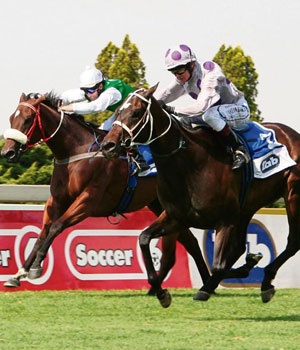
Do you love horses, riding and adventure? Well, a career as a work rider beckons. And there's big money to be made, writes Rehana Loonat
LYLE HEWITSON
Ever since he can remember, champion work rider Lyle Hewitson (17) wanted to ride horses.
So when he got on to his first racehorse at the age of 12 and it took off, he was thrilled and excited rather than afraid.
Of course, it helps that his father’s a former jockey and his mother a polocrosse player. “I guess I inherited a love of horses. It’s in my blood,” says the matric pupil at KwaZulu-Natal’s Kearsney College.
When he got on to a racehorse again at 14, he knew it was where he belonged.
“It was the defining point in my life. I realised this was what I loved.”
Hewitson hasn’t looked back since. His single-mindedness earned him the title of 2014/15 champion work rider of the year at Turffontein Racecourse in Joburg on Saturday.
A work rider takes racehorses for gallops every morning and is usually paid for every horse exercised. Accomplished work riders can race in one of several work riders’ races that feature regularly on Gauteng’s racing calendar. They are paid a fixed riding fee for racing and get 7% of the net stakes of the race if their horses cross the finish line in the first five.
Hewitson started riding competitively at 16 and has entered 55 races. He also entered the 2014/15 Work Riders’ Challenge, which consisted of three legs in which participants scored points for being the top rider in each race.
The first leg was at the Vaal Racecourse in October last year, the second was at the Vaal again in February and the last was at Turffontein on Saturday, where Hewitson was crowned champion work rider.
The challenge came with attractive financial benefits. There was an overall first prize of R20 000 for the rider with the most points over three legs, a R10 000 second prize and a R5 000 third prize. The winner of each leg also received R5 000.
Hewitson won nearly R55 000 over the three legs.
“I’ll save the money. I want to invest in my future,” he says. The fresh-faced teen is aware that he cannot ride forever. After matric, he wants to apply for a professional jockey’s licence and study further as a back-up plan.
Hewitson says work riding has its fair share of hard work. “You must be fit, healthy, keep your weight down and be prepared to start work at 5am daily. You also have to be constantly aware of the threat of injury because racehorses are athletic animals that weigh, on average, about 500kg.”
CHARLES NDLOVU
Charles Ndlovu (20) came second in the Work Riders’ Challenge and says horses have always been a part of his life.
He was brought up on the Alewynspoort farm in Eikenhof, south of Joburg, where the Thoroughbred Racing Development Centre is situated. The centre’s aim is to unearth work riders’ riding talent.
Ndlovu remembers coming home from primary school and running to the stables to see the horses.
“I rode a horse for the first time when I was eight. It was a feeling I can’t describe,” he says.
At 13, he decided that riding was what he wanted to do, so he changed his diet and lifestyle to realise his dream. At 17, he left school to join the work riders’ programme. “I had to take the opportunity. I was the right height then and knew if I grew taller, I’d miss my chance to join the programme.”
But he soon realised it had its challenges. “I thought the work would be easy, but I had to learn new skills,” he says.
Dismayed at failing the four-month programme, he tried again. “I didn’t want to disappoint my family. I wanted to show them I had left school for a good reason and I wanted to make them proud.”
Perhaps it was this, and the memory of his late father, that encouraged him. Like him, Pietrus Ndlovu grew up on the same farm. He was among the first graduates of the programme in 1999 and moved from being a work rider to become one of South Africa’s first black professional jockeys. He died in a car crash in 2010.
Ndlovu graduated from the programme on his second attempt. “I got a few work rides afterwards because my father was known in racing circles. But for the first three months, I was nervous and lacked confidence.”
Ndlovu has made “tremendous sacrifices” to fulfil his dream of becoming a professional jockey one day.
Despite his friends’ teasing, he remains a teetotaller, avoids night-time socialising and lives on fruit, vegetables, white meat and brown rice. He’s in bed daily at 8pm to start riding at 5am the next day.
“I’m happy with my career choice. I have no regrets. I will do my matric, but right now, I want to take advantage of the many opportunities for work riders.”
Ndlovu has competed in more than 50 races. He won R55 000 in the three legs of the challenge and will use the cash to extend his mother’s house. He plans to save the rest.
Of coming second in the challenge, he says: “It was a bit of a blow. I was disappointed at not winning. I felt I could have done more, but I will do better next year.”
JAMES MAREE
When former champion jockey James Maree (68), wanted to set up the Thoroughbred Racing Development Centre in 1996 he was met with scepticism from the racing fraternity.
“You’re wasting your time, it won’t work,” he was told.
But he persisted, and after much effort, he gained the support of the Racing Trust to establish the centre on his Alewynspoort farm, south of Johannesburg, in August 1999.
“My aim was simple, I just wanted to give work riders the skills to ride racehorses properly,” he says.
But he didn’t think it would grow so big – more than 1 000 riders have attended the four-month course since and some have gone on to become professional jockeys. Today, his programme is considered to be one of the most successful empowerment initiatives in South African horseracing.
Maree came from a poor background and clawed his way to the top. “I know what it’s like to be given an opportunity,” he says, “and I want to give racing stable employees an opportunity to reach their full potential and further their careers.”
Maree’s passion and commitment was duly recognised when he was presented with an Industry Award a year after the centre’s establishment.
His programme has been such a success that international racing authorities have expressed an interest in establishing similar centres in their countries.
Another feather in his cap is the fact that Phumelela – which manages horse racing in Gauteng – has a race every week for graduates of his course and hosts special race days for work riders.
In 2009, Phumelela was a key player in introducing the Work Riders’ Challenge, which is well-supported by the racing public.
HOW TO BECOME A WORK RIDER
. You must have a basic understanding of horses and have skills as a rider.
. You should ideally be 16 to 17 years old.
. You have to be the right weight and height (under 60kg and not taller than 1.67m). You should also be light-boned and athletic.
. Must be committed and willing to make sacrifices.
. Work riding is open to males and females, but you have to be tough. Work riding is not for sissies.




 Publications
Publications
 Partners
Partners








